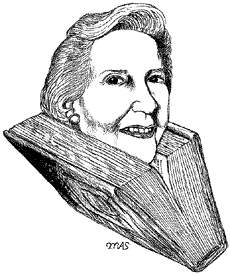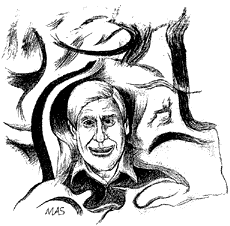Books

Personal History, by Katharine Graham (Knopf). Nobody has anything negative to say about the Washington Post owner's autobiography. The reviews differ only in emphasis. Some argue that the "iron lady" spins an inspirational feminist tale--"the story of a pioneer," says the New York Times' Christopher Lehmann-Haupt. In the Washington Post, Jill Ker Conway says the book throws more light on the "psychology of women, and the profound changes brought by the women's movement, than a dozen tomes filled with psychological jargon." Others are drawn to the gossipy details (did Graham really sleep with Adlai Stevenson the night before he died?) and her candor (on such subjects as her husband's suicide). Time's Richard Zoglin says Graham chronicles her life with "more honest self-analysis than probably any other media mogul ever." (Random House touts the book at its site.)
What It Means to Be a Libertarian: A Personal Interpretation, by Charles Murray (Broadway Books). Has Charles Murray persuasively reconciled the two conflicting traditions in American conservatism--faith in the free market and faith in tradition? In the Washington Post, Charles Krauthammer says "yes." Subsequent reviewers disagree. "[N]o editor has asked Murray to address the tricky questions that are customarily lobbed at the high school junior who reads his first Ayn Rand novel," says James Ledbetter in the Village Voice. "Libertarianism of Murray's variety is a philosophy for winners, for the same reason that 'Born Free' is a song about lions, not the animals they prey on," says Louis Menand in the New York Review ofBooks, also savaging Murray's facts and his logic. Even the conservative Weekly Standard is skeptical: "The sheer magnitude of the problems that government now fumbles with may militate against" Murray's vision of private efforts filling the void. (Slate was unimpressed as well. See Jacob Weisberg's review. Read excerpts of Murray's book at his publisher's site.)
Do the Windows Open?, by Julie Hecht (Random House). Yet another self-obsessed, neurotic narrator ("Diane Keaton playing a health-food fiend addicted to Xanax"--Michiko Kakutani, the New York Times) makes her debut in a collection of short stories. But the paranoid rantings of an East Hampton photographer are said to transcend shtick. "She's like a naturalist at a tide pool, but instead of examining shrimp and sand crabs, she tracks loss, entropy and the ravages of aging," says Laurie Stone in the Village Voice. In the New York Times Book Review, Elizabeth Frank says that Hecht writes some of the "freshest and loveliest colloquial speech to grace American fiction in a long time."
Movies
Gridlock'd (Polygram Filmed Entertainment/Gramercy Pictures). The last movie starring slain rapper Tupac Shakur (Juice, Poetic Justice) is deemed an authentic portrayal of junkie life. The twist: The villain is the welfare system. (Addicts Shakur and Tim Roth want to kick their habit but are stymied by unhelpful social-service workers.) Reviewers also seize the opportunity to imbue Shakur's meager oeuvre with an aura of James Dean-ish tragedy. Gridlock'd, in particular, bespeaks unfulfilled potential. Then there is the "perplexing chasm [that] separated the two Tupac Shakurs": the gangsta rapper (bad Tupac) and empathetic actor (good Tupac) (Richard Corliss, Time). The wistful conclusion: "[P]erhaps films would have allowed him to evade the gangsta rap typecasting forced on him by the music industry" (Richard Harrington, the Washington Post). (Click here for the official Gridlock'd site.)
Waiting for Guffman (Castle Rock/Sony Pictures Classics). A mockumentary--same genre, same producers, and some of the same writers as This Is Spinal Tap (1984), though on a different topic: the American musical and amateur theatrics. Reviews praise Guffman's spoofs of show tunes and its digs at Midwestern life, but rate it a notch below the cult classic. "The subject may not be as universal as loud music played badly," says the USA Today's Susan Wloszczyna. (Guffman.com has stills and video.)

Art
"Willem de Kooning: The Late Paintings, the 1980s" (Museum of Modern Art, New York). Is the abstract expressionist's late work a last hurrah, in the tradition of Matisse's paper cutouts? Is it senile doodling? Or is it a cynical scheme perpetrated by his ex-wife and assistants to force an Alzheimer's-afflicted artist to turn out schlock for cash? Critics are titillated by the biographical mysteries surrounding de Kooning's 1980s paintings, but maintain a genteel focus on the paintings themselves. Conclusion: The paintings are shockingly genteel, too. NewYork's Mark Stevens perceives transcendental old-age art about old age itself: "[H]e seems to empty out his art, like the man who wants to give everything away before he dies." TheNew Yorker's Calvin Tomkins finds such serenity incongruous with the rest of de Kooning's career: "What's missing is the melodrama of vulgarity. The messy, vicious slathers of pigment, the turbulence and turmoil ... [are the] essential elements of de Kooning's greatness." (MoMA's site plugs the show.)
Theater
Men Are From Mars, Women Are From Venus (Gershwin Theater, New York). "About as entertaining as having blood drawn," says Peter Marks in a vicious New York Times pan of John Gray's Broadway show (half monologue, half audience participation) based on his best-selling advice book about gender roles and personal growth. Critics dismiss it as tedious psychobabble. But, says Variety's Greg Evans, "[j]udging by his fans in attendance (mostly young couples and groups of women nudging one another and mouthing, 'That is so true')," Gray's Elmer Gantry routine "seems to work."
Event
"On Cultural Power: The Wilson-Brustein Discussion," moderated by Anna Deavere Smith (Town Hall, New York). Critics hyped the face-off between New Republic theater critic Robert Brustein and black playwright August Wilson over Afrocentric theater as "the intellectual version of extreme fighting" (Frank Rich, the New York Times). But the debate was judged to be a flop--lots of combative bravado and little payoff. "Two humorless and often petty egomaniacs intransigently reiterated their familiar positions" (Rich).
Updates
New York's David Denby joins in the general celebration of the film Kolya and its accompanying Czechophilia: "The movie speaks quietly, in the chamber-music tones of ... [a] Dvorak quartet." ... The Weekly Standard's John Podhoretz blasts Everyone Says I Love You: "Why would Woody Allen willingly make a movie that resembles nothing so much as Springtime for Hitler, the deliberately bad show at the center of Mel Brooks's classic comedy TheProducers?" ...New York's Stevens turns up the volume on the Tiepolo hype: Tiepolo "paints as a stylish swordsman might kill, with a flashing wrist; he gives us flourishes, a kind of whistling-through-the-air bravura, as if to say, 'Of course! It is easy, nothing. I was born a genius.' " (See also Christopher Benfey's review in Slate of the Tiepolo exhibits.)
Recent "Summary Judgment" columns:
Art--"Giambattista Tiepolo, 1696-1770";
Event--Halftime at Super Bowl XXXI;
Movie--Kolya;
Book--Island of the Colorblind, by Oliver Sacks;
Theater--The Steward of Christendom;
Movie--Fierce Creatures;
Book--Le Divorce, by Diane Johnson.
Book--Behind the Oval Office: Winning the Presidency in the Nineties, by Dick Morris;
Movie--The Whole Wide World;
Event--The Inauguration of William Jefferson Clinton;
Book--One World, Ready or Not: The Manic Logic of Global Capitalism, by William B. Greider;
CD--Idomeneo, by Wolfgang Amadeus Mozart, performed by Placido Domingo and the Metropolitan Opera Orchestra and Chorus, conducted by James Levine;
Movie--Albino Alligator;
Television--The Naked Truth.
Movie--La Cérémonie;
Book--The Prospect Before Her: A History of Women in Western Europe, 1500-1800, by Olwen Hufton;
Television--King of the Hill;
Architecture--Tokyo International Forum.
Movie--Beavis and Butt-Head Do America;
Book--Slouching to Gomorrah: Modern Liberalism and American Decline, by Robert Bork;
Television--Politically Incorrect With Bill Maher;
Movie--Mother;
Movie--Some Mother's Son;
Book--Christian Dior: The Man Who Made the World Look New, by Marie-France Pochna, translated by Joanna Savill;
Book--Yves Saint Laurent: A Biography, by Alice Rawsthorn.
--Compiled by Franklin Foer and the editors of Slate.
